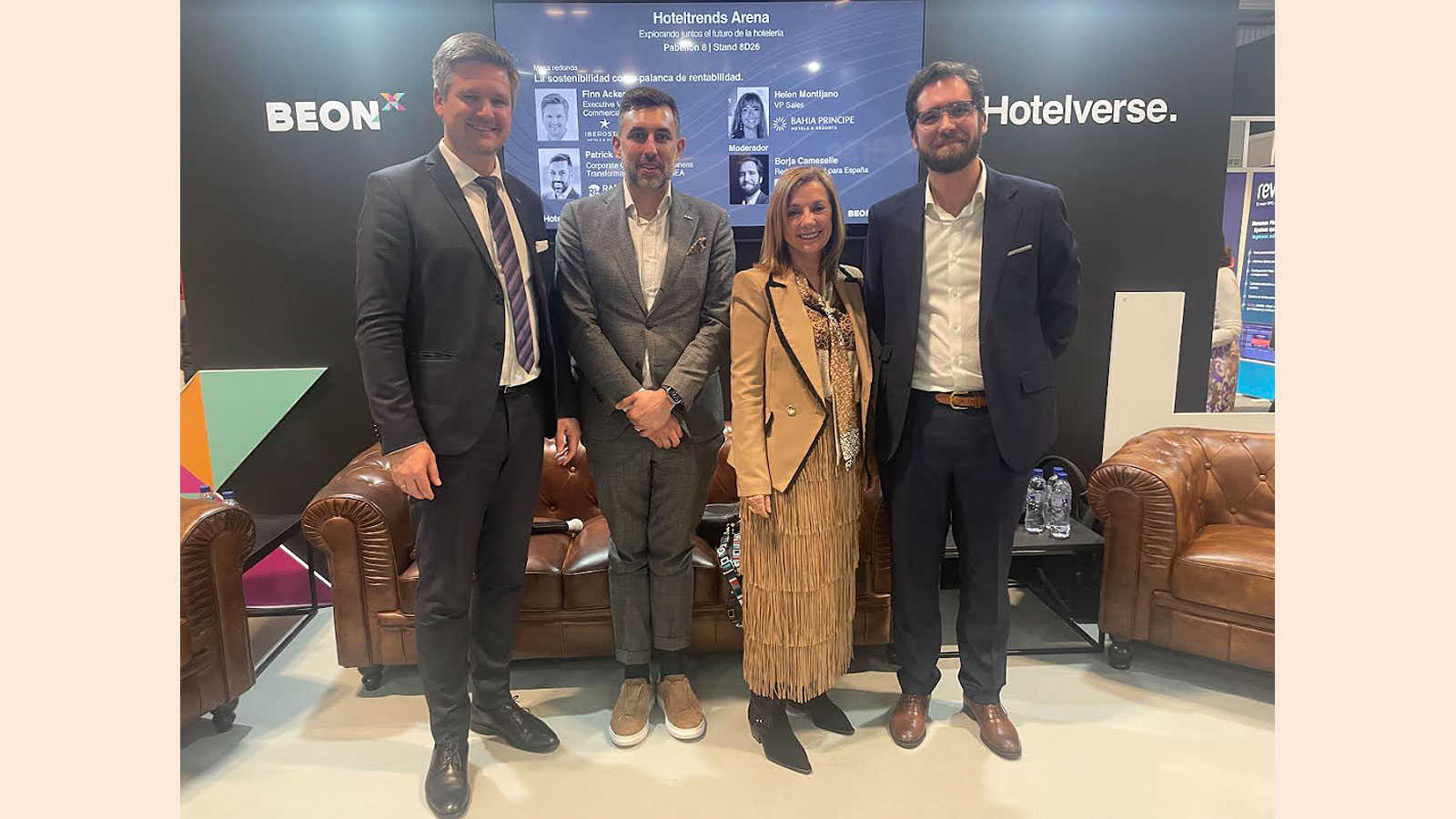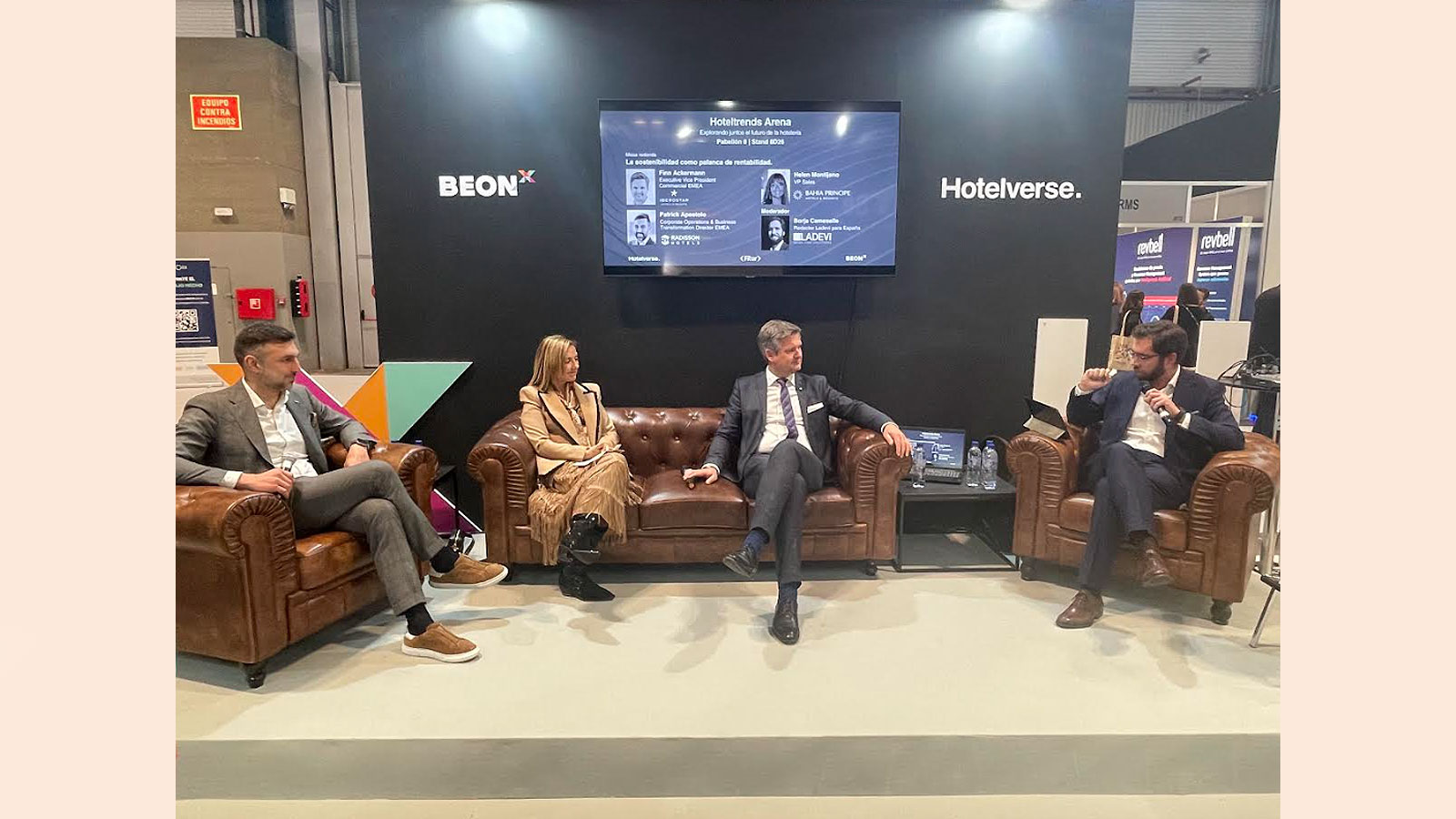In a world where environmental awareness is becoming a driving force, sustainability is a crucial element not only for social responsibility, but also for the economic profitability of hotels.
At the recent edition of FITUR in Madrid, at the joint stand of BEONx and Hotelverse, a round table discussion was held on a key topic: “Sustainability as a lever for profitability”. Moderated by journalist Borja Cameselle of LADEVI, the discussion featured experts from the hotel sector, such as Finn Ackermann of Iberostar, Patrick Apostolo of Radisson Hotels, and Helen Montijano of Bahia Principe.
Cameselle’s first reflection focused the attention of the World Travel & Tourism Council, pointing out that sustainable investments can generate significant returns in as little as two to three years. The premise is clear: sustainability is not only a moral duty, but also a tangible driver of hotel profitability.
Cameselle’s statement opened the door to an eye-opening conversation about the profitability of sustainable practices. Helen Montijano from Bahia Principe shared her perspective by approaching sustainability from a cross-cutting perspective. Beyond tangible investments, Montijano emphasised the importance of local culture, staff maintenance and education as crucial elements for the sustainable development of a hotel.
Apostolo, from Radisson, described how, over the years, the hotel industry has evolved from basic initiatives to multi-company collaborative projects. “The hotel industry must be approached with consideration of local market variables and consumer preferences. Initiatives like Soap for Hope are just the beginning. Sustainability now also involves the structure of buildings and their impact on asset value. The hotel industry must evolve to address the challenges in a collaborative way and compete in a changing market.”
Apostolo added that acceptance of sustainability has grown, even in regions such as the Middle East and Asia-Pacific, where it was previously a difficult concept to sell.
From the perspective of Finn Ackermann, from Iberostar, profitability and sustainability are intrinsically linked. Ackermann stressed that sustainability, in itself, is already profitable. “Over the years, Iberostar has launched a number of initiatives, from eliminating single-use plastics to moving towards full electrification in many of our hotels,” he said.

“We believe at Iberostar that sustainability in itself is already profitable, regardless of a business plan with an X-year payback.”
Iberostar’s experience highlights how sustainable actions not only generate environmental benefits, but over time also translate into economic benefits.
The conversation turned to the importance of profitability not only at an economic level, but also at a reputational level. Helen Montijano mentioned: “Reputation is essential for us as hoteliers. In mature markets, sustainability can be a determining factor for the customer. The key is to see sustainability as part of the DNA of the brand, not just as a marketing strategy. It is a real commitment to sustainability, creating continuous improvement and positioning the hotel as a conscious company”.
Finn Ackermann expanded on the idea, highlighting that sustainability, properly interpreted, not only does not negatively affect the customer experience, but enhances it. From small details, such as the use of glass bottles, to the implementation of artificial intelligence to reduce waste in the kitchen, sustainability becomes an element that adds value to the customer experience.
When it comes to measuring sustainability, Patrick Apostolo pointed out the importance of KPIs and technologies such as artificial intelligence to obtain valuable information. This analytical approach not only contributes to operational efficiency, but also reduces environmental impact.
The COVID-19 pandemic, while devastating for the hotel industry, also presented opportunities to assess costs and sustainability. Attendees discussed how the temporary closure of hotels allowed for a better understanding of variable and fixed costs, highlighting the need for structural interventions in hotel assets to achieve meaningful change.
Participants agreed that cooperation between hotels is essential, especially to address industry-wide challenges, “although we compete, we must also cooperate to achieve common goals. Competition is a word we need to start using a lot more,” Apostolo said.
Finn Ackermann concluded by stressing that in a world where sustainability is becoming commonplace, transparent storytelling becomes a key differentiator. “Let’s tell what we do and let the customer see it. Sustainability should not just be a marketing effort, but a reality that positively influences profitability”.
Vicky is the co-founder of TravelDailyNews Media Network where she is the Editor-in Chief. She is also responsible for the daily operation and the financial policy. She holds a Bachelor's degree in Tourism Business Administration from the Technical University of Athens and a Master in Business Administration (MBA) from the University of Wales.
She has many years of both academic and industrial experience within the travel industry. She has written/edited numerous articles in various tourism magazines.
































































































































































































